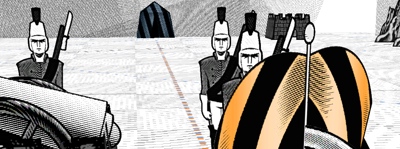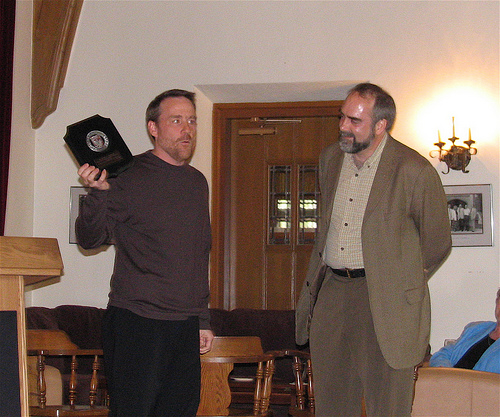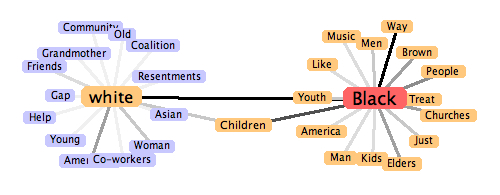I’m now at the Society for Digital Humanities annual conference at the Congress of Social Sciences and the Humanities. I am updating a Conference Report on philosophi.ca. More to come.
Digital Humanities Summer Institute
 I am now at the Digital Humanities Summer Institute at the University of Victoria where I am going to present an Institute Lecture tomorrow. I have been updating a small Conference Report (that is in progress and covers mostly the lectures.)
I am now at the Digital Humanities Summer Institute at the University of Victoria where I am going to present an Institute Lecture tomorrow. I have been updating a small Conference Report (that is in progress and covers mostly the lectures.)
In particular it was interesting to hear how Synergies has evolved into a truly national knowledge-mobilization project with good ideas about how to make SSH research accessible to the broader public.
Signs of the Times – Now, Analyze That – Reprinted
George Loper, who heard me speak at the University of Virginia New Horizons talk, has posted a “reprint” of our Now, Analyze That essay, under the title, Signs of the Times – Now, Analyze That: Obama and Wright on Race in America.
It is interesting to see how the essay looks reposted in a different environment. Loper has focused on the essay, not the interactivity, as that is his interest.
The UVic Transformer Project
The University of Victoria Humanities Computing and Media Centre have just released version 2.0 of a useful utility for converting old text files, Transformer.
This utility runs under Windows and will do batch conversions of old files. It uses JavaScript as a macro language. It is released under an open source license.
Parallel Word Processing
Well, that’s what Textflow calls their not-yet-in-beta collaborative editing system. It certainly looks attractive, it even looks like it might be nice to use. I have only had a quick look, but it claims to offer more than just multi-user document editing; instead of requiring editors to check-in/check-out portions of a document (hence locking their edits), Textflow chunks the document down into a database of edits and revision pieces of arbitrary size and maintains all the pieces of a document simultaneously over many editors. Its killer feature might be the ability to import several versions of a Word file and build a revision history with a ‘final state’ copy ready to commit or roll-back edits.
Faces stiff competition from Google Docs and ThinkFree (among others), but they look to be raising the bar.
New Horizons Conference
 So I’m at the New Horizons Conference where I’m going to be on a panel on Thursday between the Open Library and Google Books.
So I’m at the New Horizons Conference where I’m going to be on a panel on Thursday between the Open Library and Google Books.
The opening talk was by Dan Cohen of George Mason and Zotero. Zotero (Albanian for “I learn”) stands out as a phenomenal success for digital humanities (and he talked about the challenges of that success). Their server talks to about million instances a day, they have a very active user group, they are in alliances with various organizations to extend the project. Now they have figure out how to get ongoing support to keep on improving it.
See my Conference Report (which is being written as I attend.)
Now, Analyze That: An Experiment in Text Analysis
Stéfan Sinclair and I have just finished writing up an essay from an extreme text analysis session, Now, Analyze That. It is first of all a short essay comparing Obama and Wright’s recent speeches on race. The essay reports on what we found in a two day experiment using our own tools and it has interactive handles woven in that let you recapitulate our experiment.
The essay was written in order to find a way of write interpretative essays that are based on computer-assisted text analysis and exhibit their evidence appropriately without ending up being all about the tools. We are striving for a rhetoric that doesn’t hide text analysis methods and tools, but is still about interpretation. Having both taught text analysis we have both found that there are few examples of short accessible essays about something other than text analysis that still show how text analysis can help. The analysis either colonizes the interpretation or it is hidden and hard for students and others to recapitulate. Our experiments are therefore attempts to write such essays and document the process from conception (coming up with what we want to analyze) to online publication.
Doing the analysis in a pair where one of did the analysis and one documented and directed was a discovery for me. You really do learn more when you work in a pair and force yourself to take roles. I’m intrigued at how agile programming practices can be applied to humanities research.
This essay comes out of our second experiment. The first wasn’t finished because we didn’t devote enough time together to it (we really need about two days and that doesn’t include writing up the essay.) There will be more experiments as the practice of working together has proven a very useful way to test the TAPoR Portal and think through how tools can support research all the way through the life of a project, from conceptualization to publication. I suspect as we try different experiments we will be changing the portal and the tools. too often tools are designed for the exploratory stage of research instead of the whole cycle right to where you write an essay.
You can, of course, actually use the same tools we used on the essay itself. At the bottom of the left-hand column there is an Analysis Tool bar that gives you tools that will run on the page itself.
Kriegspiel: Debord Game

The New Yorker (May 5, 2008, pages 25-6) has a nice short story “War Games” in Talk of the Town about a computer game Kriegspiel based on a game that Guy Debord designed in 1977. The game, “Le Jeu De La Guerre” was published first in a limited edition with metal pieces and then in 1987 it was mass produced. The game has a board of 25 X 20 squares and each side has basic military pieces that can be played according to rules designed to simulate war. The computer implementation, which can be downloaded for free, is by Radical Software Group (RSG) which is associated with NYU.
The New Yorker story talks about how the estate of Debord has been sending cease-and-desist letters to the RSG folk, which is ironic since debord objected to copyright. Debord is author of The Society of Spectacle.
Conference ’08 – ConfTool Pro – BrowseSessions
 The 2008 Congress programme for SDH-SEMI is up. It looks like the conference on June 2nd and 3rd will be good. I will be giving a couple of papers and participating in panels:
The 2008 Congress programme for SDH-SEMI is up. It looks like the conference on June 2nd and 3rd will be good. I will be giving a couple of papers and participating in panels:
- 1.2.1 “Building Cyberinfrastructure for the Humanities in Canada” with Ray Siemens and Michael Eberle-Sinatra
- 1.3.2 “A Big Bridge: High Performance Computing and the Humanities” with Hugh Couchman
- 2.4.1 “Into Something Rich and Strange: The Digital Humanities in the Humanities” with Ray Siemens, Harvey Quamen, and Stan Ruecker
Farewell McMaster

With regrets I’m leaving McMaster and going to the University of Alberta. McMaster threw a wonderful farewell party on Monday. Dean Crosta spoke, Andrew Mactavish gave a moving speech, Liss Platt talked, Stéfan Sinclair played Alberta tunes and I was presented with a plaque that will go up on the wall of Togo Salmon Hall where previous digital humanities people at Mac have been recognized. See a small photo set of pictures taken by Stéfan here on Flickr.
